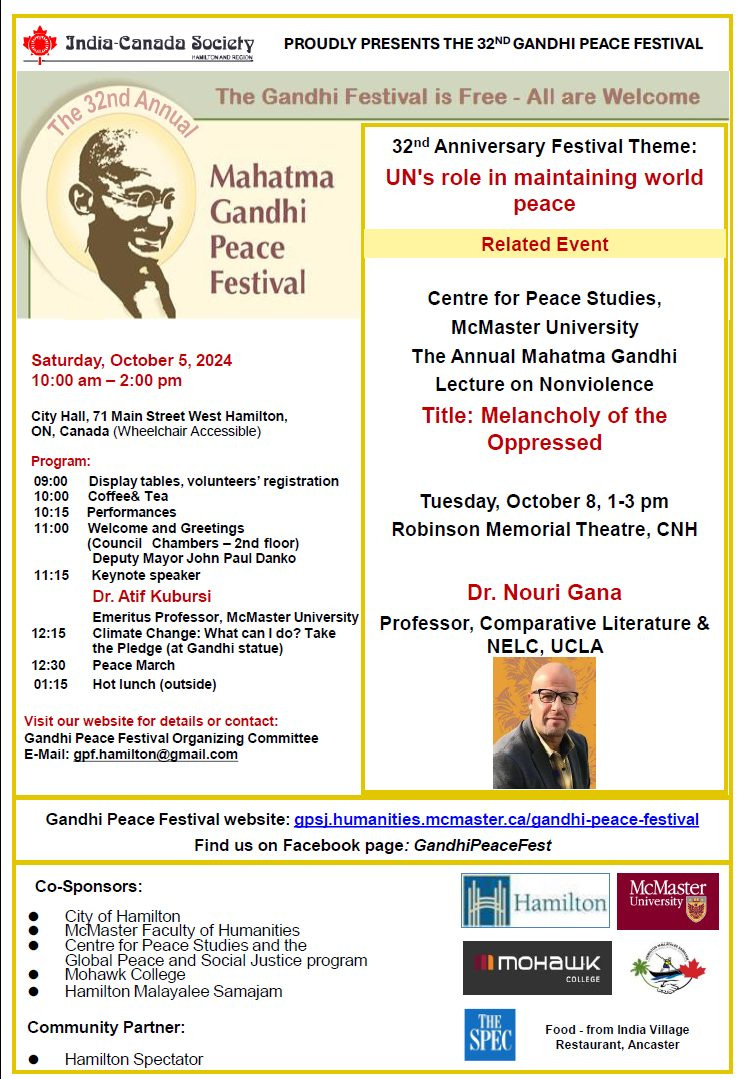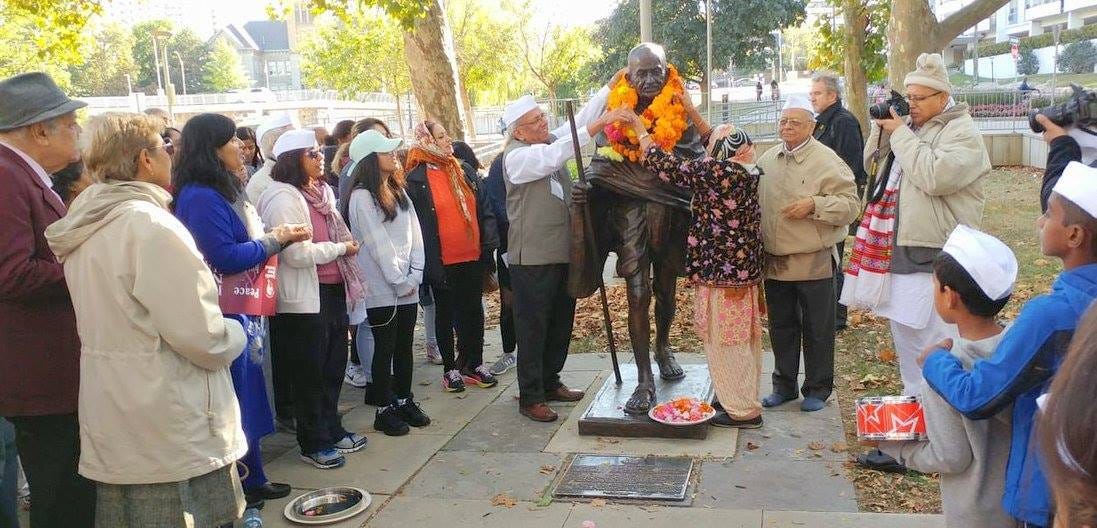Mahatma Gandhi Peace Festival tackles the difficult questions
This year’s theme is United Nations Role in Keeping World Peace with keynote address by Dr. Atif Kubursi and Lecture on Nonviolence titled: Melancholy of the Oppressed by Dr. Nouri Gana.
The 32nd Annual Gandhi Peace Festival is taking place Saturday, October 5, 2024 at Hamilton City Hall.
This year’s theme is, United Nations Role in Keeping World Peace.
Join organizers for coffee and tea and cultural performances starting at 10 am in the forecourt of City Hall.
The main session featuring a keynote address by Dr. Atif Kubursi, Professor Emeritus, Economics, McMaster University will take place inside Council Chambers at 11:15 am.
The Gandhi Peace Festival was the brainchild of Dr. Rama Singh, Professor Emeritus, Biology at McMaster University. Dr. Singh’s vision of an event to honour the birth of Gandhi came to fruition in1993 when the first Gandhi Peace Lecture and first Gandhi Peace Festival was held at the Hamilton Convention Centre on what would have been Gandhi’s 124 birthday.
Intended to be a one-time event, the lecture evolved into the Annual Mahatma Gandhi Lectures on Nonviolence endowed by donations from the Indo-Canadian community and inaugurated by Ovid Mercredi, National Chief of the Assembly of First Nations, at the McMaster Centre for Peace Studies in 1996.
In 2019, the India Canada Society and Gandhi Peace Festival celebrated the 150th Birth Anniversary of Gandhi and launched a new peace initiative: Conversation on life enhancing universal values.
This initiative became the basis of a two-day international online series of seminars on Universal Values for World Peace in February 2021. That event was followed by an in-person international conference on the same subject in October 2022 in Delhi, India.
Both events were co-organized by Gandhi Peace Festival and Temple of Understanding India Foundation (TOUIF) and were attended by Dr. Karan Singh, chair of the TOUIF.
The resulting conversations became the basis of a book authored by Dr. Rama Singh called, Towards Universal Values for World Peace, dedicated to the youth of the world. The beautifully designed,100-page hard covered book, with foreward by Dr. Karan Singh, was released on Feb 28, 2024 at India International Centre, Delhi. Copies will be available for purchase at the Peace Festival for $10 cash with proceeds going to fund the festival.
“Earth provides enough to satisfy every man’s needs, but not every man’s greed,” Mahatma Gandhi.
Towards Universal Values for World Peace explores the role capitalism, greed and the pursuit of individual rights over collective good have played in determining the world’s current trajectory toward nuclear and climate destruction.
Dr. Rama Singh maintains, in order to disrupt that trajectory, youth need to experience a revolution of values moving from a '“thing-oriented” society to a “person-oriented” society.
Throughout the book, Dr. Rama Singh quotes several non-violent activists including civil rights leader, Martin Luther King Jr. (1968), “A true revolution of values will lay hands on the world order and say of war: ‘This way of settling differences is not just.’ A genuine revolution of values means in the final analysis that our loyalties must become ecumenical rather than sectional.”
Statue of Mahatma Gandhi in forecourt of Hamilton City Hall Credit: Gandhi Peace Festival Facebook
In a related event, the Centre for Peace Studies, McMaster University will be hosting the Annual Mahatma Gandhi Lecture on Nonviolence on Tuesday, October 8, 2024 from 1 to 3 pm in Robinson Memorial Theatre.
Dr. Nouri Gana will speak about the Melancholy of the Oppressed highlighting how people survive and surpass their oppression through affective investments in cultural projects of empowerment.
With special reference to the emotional and psychological experiences of Palestinians as they actively resist oppression, Dr. Gana’s talk explores the idea that nurturing emotional engagement and connections can lead to solidarity while promoting a nonviolent path to achieving decolonization in a world in which nuclear violence and military aggression affect not only geopolitical relations, but also struggles for social justice.
In a recent email interview with Small Change, Dr. Gana elaborated on the finer points of his talk.
SC: What constitutes cultural projects of empowerment?
Dr. Gana: Cultural projects of empowerment include various non-violent forms of agitation, the everyday politics of protest against political oppression, in concert with multiple artistic and creative productions ranging from writing to filmmaking through rapping and street art, among others.
These cultural projects are expressions of investment in, and commitment to practices of, liberation from within the jaws of defeat and repression.
SC: Please share some examples of nonviolent paths to decolonization as well as non-violent paths to solidarity.
Dr. Gana: In the case of Palestine, there is the global boycott, divestment and sanctions (BDS) movement which has gained momentum in the aftermath of the genocidal onslaught on Gaza, and the two intifadas/uprisings of 1987 and 2000.
There is also the March of Return and the Freedom Flotilla.
Peaceful protest is a daily practice under occupation as in the recent protests in Sheik Jarrah against evictions and home demolitions. Staying put and not leaving one’s home and land, surviving and striving forward – all of these are everyday acts of non-violent protest that hardly catch the attention of mainstream media.
In the meanwhile, there is a robust culture of resistance and steadfastness (sumūd) that has flourished not only in Palestine but across the Arab World. The animating motivation of this culture is the principle of commitment or engagement (iltizām) which renders literary and artistic productions conscious of the sociopolitical situation from which they emerge and which they seek to transform.
SC: How does nuclear deterrence and military aggression produce and reproduce all aspects of life on earth?
Dr. Gana: Because they center the law of force and military violence as the organizing principle of international relations.
SC: Realistically, what could allies of the Palestinian People do support them while also disrupting the military industrial complex?
Dr. Gana: Non-violent movements such as BDS must be defended against the onslaught of mainstream propaganda. Similarly, the student movements across campuses against the ongoing genocide in Gaza must be supported by the public at large.
Dr. Gana is Professor of Comparative Literature & Near Eastern Languages and Cultures at the University of California in Los Angeles (UCLA). He is the author of Melancholy Acts: Defeat and Cultural Critique in the Arab World (Fordham UP, 2023), Signifying Loss: Toward a Poetics of Narrative Mourning (Bucknell UP, 2011 & paperback 2015) and the editor of The Making of the Tunisian Revolution: Contexts, Architects, Prospects as well as The Edinburgh Companion to the Arab Novel in English (Edinburgh UP, 2013).
Gandhi Peace Festival is a family, youth, and community event that is free and open to all.
Check out the complete festival schedule.
Thanks to everyone who read today’s article. With your continued support, a little Nicoll can make a lot of change.





Most days I grieve for humanity. We must support peace and humanity against the 'war lords'.
thank you for bringing a moment of hope.